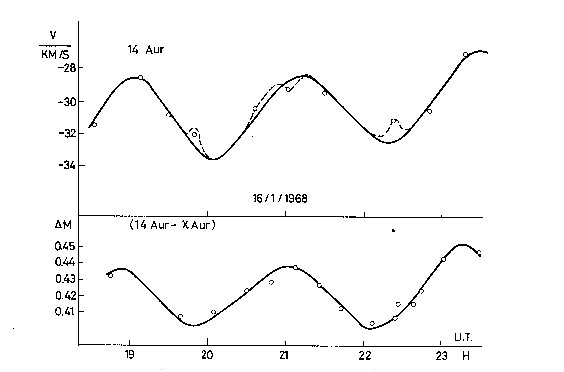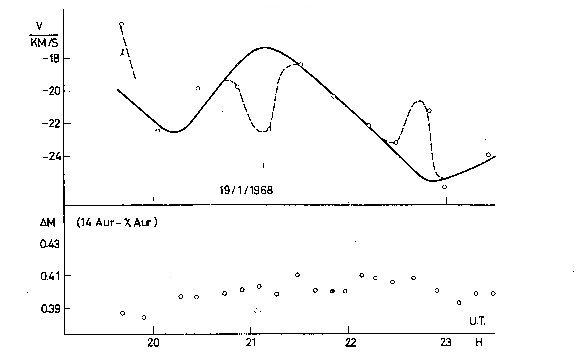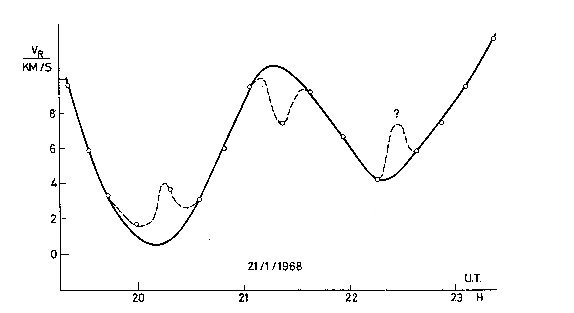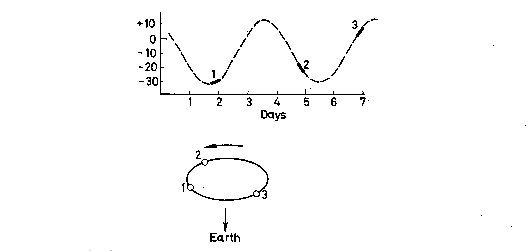Non-Periodic Phenomena in Variable Stars
IAU Colloquium, Budapest, 1968
THE SHORT-PERIOD VARIABILITY OF 14 AUR (HR 1706)
C. CHEVALIER
Institut d'Astrophysique de Paris
14 Aur (HR 1706) has a magnitude V = 5.05, spectral type A9V.
It is a close spectroscopic binary with an almost circular orbit, the period
being 3.79 days (Harper 1916). Its short-period variability was first noticed
by Danziger and Dickens (1967). According to their photoelectric U B V
observations, the variation in the magnitude V was about 0.07 magn., with
a period of 0.122 days (~ 3 hours).
We have obtained in 1968 on five nights photometric measurements
and three nights radial velocity measurements at the Haute-Provence observatory.
On two nights, on January 16 and 19, the observations were simultaneous.
PHOTOMETRIC OBSERVATIONS
They are described in the paper by Chevalier et al. (1968). The results
are listed in Table I and plotted in Figs. 1 and 2.
RADIAL VELOCITY MEASUREMENTS
Coudé spectra were taken with the 193 cm telescope at a dispersion of
10 A/mm. The plates were measured on a Ferranti machine at the Marseille
Observatory. The measured lines are listed in table II, the results obtained
are listed in table III and plotted in Figs. 1, 2 and 3.
COMMENTS
Both of the variations in magnitude and in radial velocity confirm the
existence of a short-period pulsation of 14 Aurigae. In the two cases, the period
obtained is about 2 hours 15 min. with an accuracy of about 15 min. The
radial velocity curves seem to indicate the existence of secondary periods.
We notice opposite variations in the amplitudes of the light curve and
the radial velocity curve.
Table I
Photometric Measurements
Date U. T. Delta m
(1968) (chi Aur-14 Aur)
January 16 18 h 44 m 0.431
JD: 2 439 872 19 39 0.407
20 05 0.410
29 0.423
48 0.429
21 07 0.439
24 0.428
42 0.413
22 07 0.404
27 0.415
39 0.416
43 0.420
56 0.433
23 26 0.447
January 18 19 h 30 m 0.390
JD: 2 439 874 20 14 0.390
30 0.404
54 0.424
21 06 0.424
18 0.422
32 0.404
44 0.394
56 0.387
January 19 19 h 08 m 0.442*
JD: 2 439875 40 0.388
53 0.385
20 04 0.380
16 0.398
25 0.398
43 0.400
53 0.402
21 04 0.405
15 0.400
28 0.412
38 0.402
49 0.402
57 0.402
22 07 0.410
15 0.410
26 0.408
39 0.410
54 0.402
23 07 0.395
18 0.400
29 0.400
January 20 20 h 50 m 0.387
JD: 2 439876 21 00 0.386
10 0.390
20 0.396
30 0.414
40 0.427
50 0.434
* Delta m practically constant during this night.
Table II
Measured Lines
No. Wavelengths (Lambda) Elements
1 4030.678 MnI (2) blend
2 4034.490 MnI (2)
3 4045.190 FeI (43) blend
4 4063.545 FeI (43), MnI (5)
5 4071.740 FeI (43)
6 4077.714 SrII (1)
7 4101.737 H delta
8 4202.031 FeI (42)
9 4215.524 SrII (1)
10 4340.468 H gamma
11 4383.547 FeI(41)
12 4404.752 FeI(41)
13 / MgII (4) 0.129
4481.228 \ MgII (4) 0.327
Table III
Radial Velocity Measurements
Date Heliocentric Rms Number Exposure
(1968) U. T. radial deviation of lines (min) Plates
velocity
Jan. 16 18 h 33 m -31.43 km/sec 0.19 km/sec 13 24 baked IIaO
19 07 -28.54 0.29 13 14 baked IIaO
28 -30.85 0.18 13 16 baked IIaO
JD 2 439 872 48 -32.07 0.20 13 15 baked IIaO
20 10 -33.37 0.40 13 20 baked IIaO
35 -30.40 0.40 13 20 baked IIaO
21 02 -29.22 0.25 12 23 baked IIaO
28 -29.46 0.41 12 26 baked IIaO
22 21 -31.09 0.30 13 22 baked IIaO
49 -30.50 0.49 13 27 baked IIaO
23 16 -27.02 0.33 13 22 baked IIaO
41 -27.28 0.40 13 22 baked IIaO
Jan. 19 19 h 40 m -15.99 km/sec 0.52 km/sec 11 15 IaO
20 02 -22.41 0.53 12 20 IaO
27 -19.69 0.51 13 24 IaO
JD 2 439 875 51 -19.68 0.37 13 12 IaO
21 10 -22.34 0.55 12 15 IaO
30 -18.36 0.50 13 18 IaO
50 -20.29 0.49 13 17 IaO
22 11 -22.05 0.20 13 17 IaO
28 -23.10 0.70 13 11 IaO
48 -21.11 0.25 13 19 IaO
23 08 -25.83 0.73 11 16 IaO
25 -23.73 0.50 10 12 IaO
Jan. 21 19 h 20 m + 9.63 km/sec 0.37 km/sec 12 8 IaO
31 5.45 0.71 11 9 IaO
JD 2 439 877 43 3.36 0.58 12 13 IaO
59 1.80 0.45 10 16 IaO
20 18 3.75 0.58 13 14 IaO
35 3.19 0.33 13 11 IaO
49 6.08 0.30 11 11 IaO
21 03 9.61 0.53 12 15 IaO
21 7.54 0.52 11 12 IaO
36 9.27 0.47 12 16 IaO
55 6.78 0.31 11 17 IaO
22 15 4.33 0.40 11 19 IaO
37 5.93 0.62 11 11 IaO
51 7.61 0.52 11 11 IaO
23 05 9.69 0.53 12 12 IaO
20 12.42 0.42 11 11 IaO
On January 16, the light curve is perfectly regular with an amplitude
of about 0.04 magn. The radial velocity curve is regular too, with an amplitude
of 5 km/sec.
Three days later, on January 19, the light curve is practically flat and,
on the contrary the amplitude of radial velocity curve is about 10 km/sec,
that is, multiplied by the factor two.
 Fig. 1. Light curve and radial velocity curve of 14 Aur obtained simultaneously
on Jan. 16 (1968).
Fig. 1. Light curve and radial velocity curve of 14 Aur obtained simultaneously
on Jan. 16 (1968).
 Fig. 2. Light curve and radial velocity curve of 14 Aur obtained simultaneously
on Jan. 19 (1968).
Fig. 2. Light curve and radial velocity curve of 14 Aur obtained simultaneously
on Jan. 19 (1968).
 Fig. 3. Radial velocity curve of 14 Aur obtained on Jan. 21 (1968).
On January 21, the amplitude of the radial velocity curve is 10 km/sec
again.
Our results have to be confirmed before attempting any interpretation,
and particularly before calculating any detailed model of the pulsating star.
Fitch has calculated that the modulations of the light and radial velocity
curves of 16 Lacertae and CC And might be due to resonances between pulsation
and orbital movement, by means of tidal effects.
But either an excentric orbit or a lack of synchronism between self-rotation
of the star and its orbital motion are necessary to produce such an effect.
Crude calculations seem to indicate that the rotation of 14 Aur is probably
synchronized with its orbital motion. Otherwise, its orbit is almost circular
(e = 0.033, from Harper).
Fig. 3. Radial velocity curve of 14 Aur obtained on Jan. 21 (1968).
On January 21, the amplitude of the radial velocity curve is 10 km/sec
again.
Our results have to be confirmed before attempting any interpretation,
and particularly before calculating any detailed model of the pulsating star.
Fitch has calculated that the modulations of the light and radial velocity
curves of 16 Lacertae and CC And might be due to resonances between pulsation
and orbital movement, by means of tidal effects.
But either an excentric orbit or a lack of synchronism between self-rotation
of the star and its orbital motion are necessary to produce such an effect.
Crude calculations seem to indicate that the rotation of 14 Aur is probably
synchronized with its orbital motion. Otherwise, its orbit is almost circular
(e = 0.033, from Harper).
 Fig. 4. Radial velocity curve of 14 Aur due to its orbital motion,
(from Harper 1916), and positions corresponding to our observations.
Another explanation of these opposite modulations of the light and radial
velocity curves could be non radial oscillations of the star, the apparent
amplitudes depending obviously on the position of 14 Aur in its orbit.
Anyway, it would be premature to make any conclusion.
REFERENCES
Chevalier, C., Le Contel, J. M., Perrin, M. N., 1968, Astrophys. Letters, vol. II.
Danziger, I. J. and Dickens, R., 1967, Astrophys. J., 149, 55.
Fitch, 1968, Budapest Conference on Variable Stars.
Harper, W. E., 1916, J. R. astr. Soc. Canada 10, 165.
DISCUSSION
Fitch: 1) Is 14 Aurigae a spectroscopic binary, and if so what is its period?
2) (In reply to the question from Baglin concerning possibility of tidal
exploration of observed strong modulation in light and velocity of
14 Aurigae: )
Yes, I think it most likely that tidal effects can explain the variations
you have observed in the light and velocity variations of 14 Aurigae.
3) With regard to your observation of large velocity variation simultaneous
with nearly constant light on one night, a similar type of phenomenon
occurs in 16 Lacertae (which is, of course, a very different kind of
star). In that star one finds that the light-to-velocity amplitude
ratios are very different in the various observed (probably non-radial)
pulsation modes, so that sometimes one observes an appreciable
velocity amplitude with almost no corresponding light variation.
Chevalier: Yes, 14 Aurigae is a close spectroscopic binary, its period is 3.79
days, its orbit is almost circular. Companion is unknown. It seems that
the inclination of the orbit is not very high. Reference: Harper (1916)
Fig. 4. Radial velocity curve of 14 Aur due to its orbital motion,
(from Harper 1916), and positions corresponding to our observations.
Another explanation of these opposite modulations of the light and radial
velocity curves could be non radial oscillations of the star, the apparent
amplitudes depending obviously on the position of 14 Aur in its orbit.
Anyway, it would be premature to make any conclusion.
REFERENCES
Chevalier, C., Le Contel, J. M., Perrin, M. N., 1968, Astrophys. Letters, vol. II.
Danziger, I. J. and Dickens, R., 1967, Astrophys. J., 149, 55.
Fitch, 1968, Budapest Conference on Variable Stars.
Harper, W. E., 1916, J. R. astr. Soc. Canada 10, 165.
DISCUSSION
Fitch: 1) Is 14 Aurigae a spectroscopic binary, and if so what is its period?
2) (In reply to the question from Baglin concerning possibility of tidal
exploration of observed strong modulation in light and velocity of
14 Aurigae: )
Yes, I think it most likely that tidal effects can explain the variations
you have observed in the light and velocity variations of 14 Aurigae.
3) With regard to your observation of large velocity variation simultaneous
with nearly constant light on one night, a similar type of phenomenon
occurs in 16 Lacertae (which is, of course, a very different kind of
star). In that star one finds that the light-to-velocity amplitude
ratios are very different in the various observed (probably non-radial)
pulsation modes, so that sometimes one observes an appreciable
velocity amplitude with almost no corresponding light variation.
Chevalier: Yes, 14 Aurigae is a close spectroscopic binary, its period is 3.79
days, its orbit is almost circular. Companion is unknown. It seems that
the inclination of the orbit is not very high. Reference: Harper (1916)
 Fig. 1. Light curve and radial velocity curve of 14 Aur obtained simultaneously
on Jan. 16 (1968).
Fig. 1. Light curve and radial velocity curve of 14 Aur obtained simultaneously
on Jan. 16 (1968).
 Fig. 2. Light curve and radial velocity curve of 14 Aur obtained simultaneously
on Jan. 19 (1968).
Fig. 2. Light curve and radial velocity curve of 14 Aur obtained simultaneously
on Jan. 19 (1968).
 Fig. 3. Radial velocity curve of 14 Aur obtained on Jan. 21 (1968).
On January 21, the amplitude of the radial velocity curve is 10 km/sec
again.
Our results have to be confirmed before attempting any interpretation,
and particularly before calculating any detailed model of the pulsating star.
Fitch has calculated that the modulations of the light and radial velocity
curves of 16 Lacertae and CC And might be due to resonances between pulsation
and orbital movement, by means of tidal effects.
But either an excentric orbit or a lack of synchronism between self-rotation
of the star and its orbital motion are necessary to produce such an effect.
Crude calculations seem to indicate that the rotation of 14 Aur is probably
synchronized with its orbital motion. Otherwise, its orbit is almost circular
(e = 0.033, from Harper).
Fig. 3. Radial velocity curve of 14 Aur obtained on Jan. 21 (1968).
On January 21, the amplitude of the radial velocity curve is 10 km/sec
again.
Our results have to be confirmed before attempting any interpretation,
and particularly before calculating any detailed model of the pulsating star.
Fitch has calculated that the modulations of the light and radial velocity
curves of 16 Lacertae and CC And might be due to resonances between pulsation
and orbital movement, by means of tidal effects.
But either an excentric orbit or a lack of synchronism between self-rotation
of the star and its orbital motion are necessary to produce such an effect.
Crude calculations seem to indicate that the rotation of 14 Aur is probably
synchronized with its orbital motion. Otherwise, its orbit is almost circular
(e = 0.033, from Harper).
 Fig. 4. Radial velocity curve of 14 Aur due to its orbital motion,
(from Harper 1916), and positions corresponding to our observations.
Another explanation of these opposite modulations of the light and radial
velocity curves could be non radial oscillations of the star, the apparent
amplitudes depending obviously on the position of 14 Aur in its orbit.
Anyway, it would be premature to make any conclusion.
REFERENCES
Chevalier, C., Le Contel, J. M., Perrin, M. N., 1968, Astrophys. Letters, vol. II.
Danziger, I. J. and Dickens, R., 1967, Astrophys. J., 149, 55.
Fitch, 1968, Budapest Conference on Variable Stars.
Harper, W. E., 1916, J. R. astr. Soc. Canada 10, 165.
DISCUSSION
Fitch: 1) Is 14 Aurigae a spectroscopic binary, and if so what is its period?
2) (In reply to the question from Baglin concerning possibility of tidal
exploration of observed strong modulation in light and velocity of
14 Aurigae: )
Yes, I think it most likely that tidal effects can explain the variations
you have observed in the light and velocity variations of 14 Aurigae.
3) With regard to your observation of large velocity variation simultaneous
with nearly constant light on one night, a similar type of phenomenon
occurs in 16 Lacertae (which is, of course, a very different kind of
star). In that star one finds that the light-to-velocity amplitude
ratios are very different in the various observed (probably non-radial)
pulsation modes, so that sometimes one observes an appreciable
velocity amplitude with almost no corresponding light variation.
Chevalier: Yes, 14 Aurigae is a close spectroscopic binary, its period is 3.79
days, its orbit is almost circular. Companion is unknown. It seems that
the inclination of the orbit is not very high. Reference: Harper (1916)
Fig. 4. Radial velocity curve of 14 Aur due to its orbital motion,
(from Harper 1916), and positions corresponding to our observations.
Another explanation of these opposite modulations of the light and radial
velocity curves could be non radial oscillations of the star, the apparent
amplitudes depending obviously on the position of 14 Aur in its orbit.
Anyway, it would be premature to make any conclusion.
REFERENCES
Chevalier, C., Le Contel, J. M., Perrin, M. N., 1968, Astrophys. Letters, vol. II.
Danziger, I. J. and Dickens, R., 1967, Astrophys. J., 149, 55.
Fitch, 1968, Budapest Conference on Variable Stars.
Harper, W. E., 1916, J. R. astr. Soc. Canada 10, 165.
DISCUSSION
Fitch: 1) Is 14 Aurigae a spectroscopic binary, and if so what is its period?
2) (In reply to the question from Baglin concerning possibility of tidal
exploration of observed strong modulation in light and velocity of
14 Aurigae: )
Yes, I think it most likely that tidal effects can explain the variations
you have observed in the light and velocity variations of 14 Aurigae.
3) With regard to your observation of large velocity variation simultaneous
with nearly constant light on one night, a similar type of phenomenon
occurs in 16 Lacertae (which is, of course, a very different kind of
star). In that star one finds that the light-to-velocity amplitude
ratios are very different in the various observed (probably non-radial)
pulsation modes, so that sometimes one observes an appreciable
velocity amplitude with almost no corresponding light variation.
Chevalier: Yes, 14 Aurigae is a close spectroscopic binary, its period is 3.79
days, its orbit is almost circular. Companion is unknown. It seems that
the inclination of the orbit is not very high. Reference: Harper (1916)